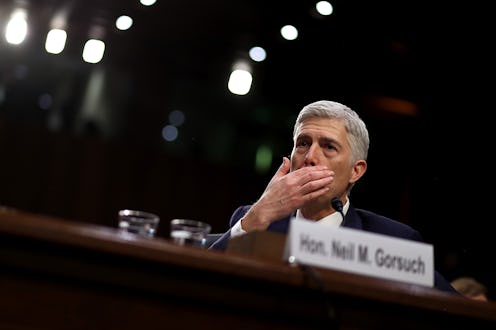News
Chuck Schumer Wants Democrats To Filibuster Neil Gorsuch

As Supreme Court nominee Neil Gorsuch's Senate hearings continue to reveal more about the circuit court judge's character, background, and beliefs, Democrats have more reason than ever to block his confirmation. On Mar. 23, Senate Minority Leader Chuch Schumer urged his Democratic colleagues to filibuster Gorsuch's confirmation. But will the party actually go through with it? It remains unclear whether the party will follow him, and only a handful of Democratic senators have come out publicly about their plans to vote against Gorsuch's confirmation. Democrats will, however, require that Gorsuch be confirmed by a majority of 60 votes, which means at least eight Democratic senators must vote for his confirmation along with the 52 GOP senators who control the slight majority in the Senate.
Reports that some Democrats were considering voting to confirm Gorsuch raised concerns about whether he would receive the Democratic votes needed to pass the Senate. Perhaps in response to these reports of Democrats weighing deals to confirm Gorsuch, Schumer announced that he would oppose Trump's nominee, but did not speak to whether or not his colleagues will do the same. Now, time could is running short.
The uncertainty over whether or not Dems will vote to confirm Gorsuch is the latest in the battle over the effectiveness or necessity of opposing Trump's every nomination and policy on principle — the same strategy Republicans took during Obama's presidency.
In some instances, Democrats have already appeared to strike a conciliatory posture by voting for some of Trump's nominees. There were, of course, some instances of outright defiance, including the all-night rally in opposition of Betsy DeVos' confirmation as Education secretary, and a similar late-night session to oppose Jeff Sessions for attorney general, but these specific examples pale in comparison to the massive grassroots organizing efforts to resist Trumpism that Democrats seem hesitant to follow.
Activists further left than the mainstream of the Democratic Party are watching their confirmation votes closely to assess whether or not they'll wield the power of their offices usefully in spite of being members of the minority party in the House and Senate. After all, Gorsuch will need slight Democratic support to be confirmed, and if even a handful of Democrats give in, the possibility of Democrats acting as a legitimate force of opposition to Trump and the Republicans who back him will grow ever slimmer. In other words, Gorsuch's confirmation holds a lot of significance for both his future as well as that of the Congressional Democrats.